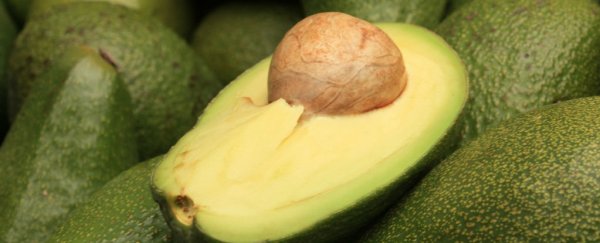
It's hard to go past a perfectly ripe avocado. And lucky for us, these things are so packed with nutrients, it hurts. Not only are they high in fibre, monounsaturated fatty acids, antioxidants, B6, vitamin E, and a bunch of healthy fats, they're also packed with twice the amount of potassium as bananas. And all of these work in conjunction with the nutrients we get from other fruits and vegetables - throw some avocado in a salad and you'll absorb nutrients from the rest of the ingredients more easily, says this episode of Reactions from the American Chemical Society.
Oh and that ugly, tough skin? Well, that's one of the avocado's best qualities - it's so dense, it keeps out pesticides, making it one of the safest fruits to eat (which is why you should think twice before forking out that extra cash for organic avocados).
Cut through that skin and you'll get access to 11 different carotenoids, which are naturally occurring pigments found in plants, fungi, and some bacteria that have been found to impart many health benefits, including decreasing the risk of disease, particularly certain cancers and eye disease. Beta-Carotene, for example, is thought to have added benefits because of its ability to be converted to vitamin A, and lutein and zeaxanthin might protect our eyes from disease because they absorb the damaging blue light that enters the eye.
If you want to take advantage of all that, you're going to want to make the most of the dark green portion of the fruit directly under the skin, and the video above shows you the best technique to maximise how much of this velvety goodness you get. (Plus it doesn't involve stabbing a knife into the seed, which could save you a trip to the hospital.)
But alas, avocados aren't perfect - they contain compounds called phenols, and these guys are responsible for the ridiculously fast browning that takes place as soon as you cut into one. When exposed to oxygen, the phenols will convert into an entirely different class of compounds called quinones, and over time, these link together to form a pigment called melanin. Yep, the same compounds that give our skin its colour.
On top of that, avocados are packed with an enzyme called polyphenol oxidase, which acts to speed up this whole browning process even further. Why, nature, why?
Any avocado fan will know a temporary counter to this is lemon or lime juice, because the acid it carries can slow down the activity of the enzymes. But did you also know that if you douse your guacamole in cold water and store it in the fridge overnight, it will help stop the browning? Just tip the excess water out the next day and stir your guac and it'll be (almost) as good as new, the American Chemical Society recommends.
Watch the video above for more tips, and remember, step away from the knife. Don't be like Meryl Streep and learn the hard way.
